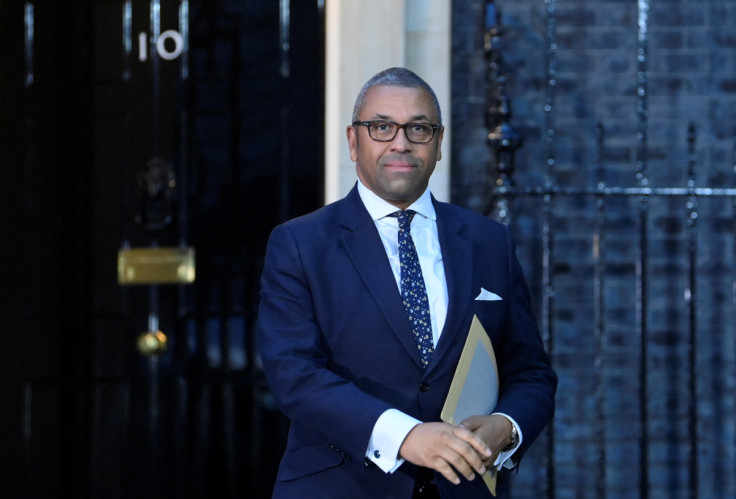British Foreign Secretary travels to US with Russia-Ukraine war on the agenda
British Foreign Secretary James Cleverly meets US Secretary of State Antony Blinken to discuss the approach of Britain and the US to Ukraine and bilateral international trade.

It is often said that the UK and the US have developed a "special relationship" in the course of history, with diplomatic relations going all the way back to 1785. Since then, much has been endured by the two nations on either side of the Atlantic. The event of two world wars, the establishment of NATO and the alliance between Britain and the US in many conflicts including in Iraq and Afghanistan have consolidated the close ties between the two nations.
Earlier this year in April, President Biden visited Northern Ireland in light of the 25th anniversary of the Good Friday Agreement, demonstrating close ties across the Atlantic.
However, despite his invitation, President Biden did not attend the recent coronation of King Charles. Instead, First Lady Jill Biden and a diplomatic envoy were in attendance. Whilst it has been traditional for US Presidents to miss coronations, Biden's absence could be interpreted as a poor reflection of the current status of the relationship between Britain and the US.
As well as the experience of a common history, the close ties between Britain and the US are grounded in common domestic values. In the words of British Foreign Secretary James Cleverly: "For well over a century the UK and US have been partners of first resort in standing up for freedom and democracy."
Today (the 9th of May) Cleverly is scheduled to meet US Secretary of State Antony Blinken in Washington, to discuss the approach of the British and US governments to Ukraine. On Wednesday, Cleverly is scheduled to meet members of Congress, including both leading Democrats and Republicans.
The purpose of the Foreign Secretary's visit is to discuss the long-term international commitment to Ukraine between Britain and the US. Britain's objective is to ensure the emergence of Ukraine as a "sovereign and free nation" from the war. That means victory for Ukraine, with Cleverly set to stress the importance of a "united international front" as the way to achieving it.
The visit comes as Russia holds its "Victory Day holiday" to mark the defeat of Nazis Germany. Crucially, a new wave of strikes has been launched in Ukraine, including in the capital Kyiv.
The meeting also comes ahead of the upcoming G7 summit in Hiroshima later this month, where Prime Minister Rishi Sunak and President Biden will attend alongside other world leaders committed to liberal democracy and the preservation of an international order based on common rules.
International Trade
Also on the agenda is the economic relationship between Britain and the US. The Foreign Secretary's mission will also be "to encourage the $1 trillion bilateral investment relationship" between the two allies.
However, one reason to be sceptical of the so-called special relationship between Britain and the US is the lack of a post-Brexit free trade deal between the two nations.
Negotiations between Britain and the United States for a post-Brexit free trade deal started in May 2020, according to the report, "Progress on UK free trade agreement negotiations", with no further negotiation rounds after October of that year. Therefore, whilst Britain has signed several new trade agreements since leaving the EU (with Australia, New Zealand, Singapore, and Ukraine), no agreement has been reached with the US as of yet.
Britain has also been accepted into the Comprehensive and Progressive Agreement for Trans-Pacific Partnership (CPTPP), an agreement the government is expected to sign later this year.
Indeed, former Prime Minister Liz Truss said last year that agreement on a free trade deal with the US "was unlikely in the short to medium term." Given that the government has stated that it intends to continue to pursue a deal, it will be interesting to see if any progress can be made during the Foreign Secretary's visit.
The lack of a deal comes despite the fact that the UK and the US already possess a substantive bilateral trading relationship. In 2019, Britain and the US traded $273 billion worth of goods and services. The Office for National Statistics shows that in 2020, the US was Britain's largest trading partner, followed by Germany, China, the Netherlands and France.
Additionally, the same report on the progress of Britain's free trade agreement negotiations further stated that one reason for the lack of a deal is the focus of the Biden administration on domestic affairs over creating new international trade agreements. Also mentioned is the expiration of the US's Trade Promotion Authority, an institution which could fast-track trade agreements through Congress.
© Copyright IBTimes 2025. All rights reserved.




















